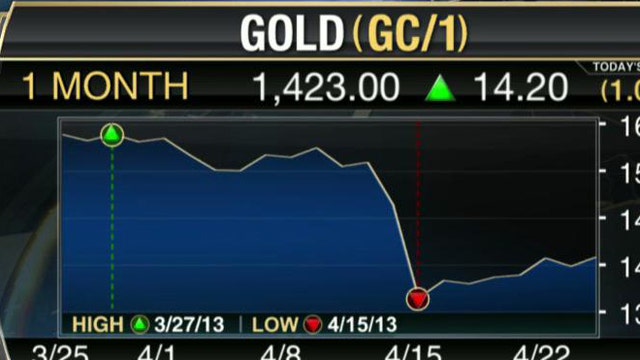Gold: What happened?!
At what point do you break down and admit your macro thesis was wrong? This is the question a lot of hedge fund managers are having to ask themselves given gold’s performance over the past seven months.
On the surface, gold made so much sense. With every major central bank in the world engaging in some sort of quantitative easing program, with the Eurozone still threatening to descend into crisis again, and with the U.S. government partially shut down due to political infighting, gold had to go up, right?
Wrong.
I think the gold bulls based their outsized gold bets on some pretty flimsy thinking and they committed the cardinal investing sin of omission: they failed to use second-order thinking. I also think they also used the wrong historical examples as analogies to today - and drew the wrong conclusions.
What am I talking about? I don’t believe a macro trade is ever as simple as “if [condition A] is met, then [asset B] will rise/fall in value.” Filling in the blanks here, “If the Fed prints money and debases the dollar, then gold will rise as an alternate currency.”
That sounds good. But it absolutely fails to take into consideration market expectations. If the market is already expecting this, it will have bid up the price of gold in anticipation. I take a contrarian view: you have to be seeing something that is not already reflected in prices. And after more than a decade of raging bull market returns, there were already a lot of inflation / currency debasement factored in to the gold price.
But the error made by gold bugs goes beyond this, as I see it. Not only did they fail in second-order thinking, they also based their trade on a false premise—that the Fed’s quantitative easing had to generate inflation.
Many based this view on the experience of the 1970s, the decade of “stagflation” and the “misery index” - for those readers who remember those years. But the 1970s are a bad example; we were a demographically young and relatively debt-free country back then, both at the government and private sector levels.
The historical example I believe they should have used is 1990s Japan. After a fantastic boom throughout the 1980s that culminated in gargantuan stock market and real estate bubbles, Japan blew up. Its bubbles burst, its financial sector was ruined and reduced to zombie status, and Japanese consumers—whose demographics then looked close to those of America’s baby boomers circa 2008—went into retrenchment mode, where they have stayed ever since.
Japan did everything we’re doing today. It propped its banks up. It used Keynesian deficit spending to prop up demand artificially, amassing debts that dwarf America’s by comparison, and introduced the term “quantitative easing” to the vocabulary of central bankers.
And guess what. It didn’t generate inflation. Japan remains mired in deflation more than 20 years later. I believe Japan will eventually have a sovereign debt and currency crisis that climaxes in a hyperinflationary meltdown. But that is another story for another day (and one that I hope to profit from). The point here is that I think the gold trade was based on faulty assumptions, and when the large hedge fund traders started to realize this and wind down their positions, they essentially tripped over each other trying to get out the door first. And thus the gold price implosion…
What happens now? I don’t know, but I do know that I don’t want get in the way of a selling avalanche. If I am correct about large hedge fund managers dumping gold, then it doesn’t make sense to buy the dips right now.
The investments discussed are held in client accounts as of March 31, 2013. These investments may or may not be currently held in client accounts. The reader should not assume that any investments identified were or will be profitable or that any investment recommendations or investment decisions we make in the future will be profitable.
Covestor Ltd. is a registered investment advisor. Covestor licenses investment strategies from its Model Managers to establish investment models. The commentary here is provided as general and impersonal information and should not be construed as recommendations or advice. Information from Model Managers and third-party sources deemed to be reliable but not guaranteed. Past performance is no guarantee of future results. Transaction histories for Covestor models available upon request. Additional important disclosures available at http://site.covestor.com/help/disclosures.




















